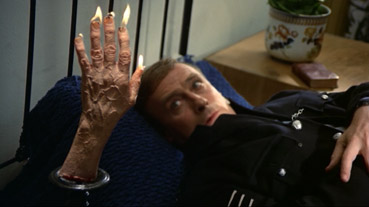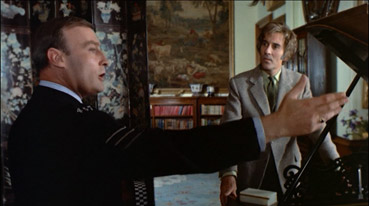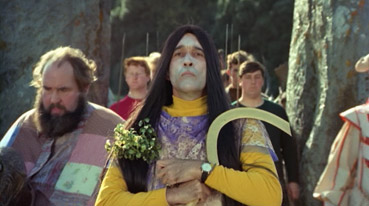|
To
coincide with the wonderful event of the theatrical release
of the Hollywood remake,
Optimum have brought out their Collector's Edition of the
original classic on DVD. I will attempt to rekindle the
flame that burnt so brightly that the embers still shine
33 years on.
The
1960s saw a lot of British horror films, more or less exclusively
from Hammer. By the time the early 70s came around we were
craving something different. Something with a bit more substance.
Our prayers were answered in the form of The Wicker
Man in 1973.
Written
by Anthony Shaffer, who wrote the screenplay based on the
little known David Pinner novel called Ritual,
and directed by first timer Robin Hardy, the film was sold
on the author's name (Shaffer had success with previous
screenplays and his Sleuth was a hit on
Broadway) and the inclusion of Hammer favourite Christopher
Lee. It is a story about the occult on an island off Scotland.
At the time one would be forgiven for thinking 'Nothing
remarkable'. But what set The Wicker Man
aside from British Hammer horrors and the overseas American
Corman movies was a mixture of an adult naturalism counter
to the gothicism and exploitationalism of the established
modes of the genre.

For those not familiar with the premise of the film, I will
give a brief synopsis.
Inspector
Howie (Edward Woodward) of the Scottish police is sent to
an island off the mainland called Summerisle to investigate
the disappearance of a child native to the island, Rowan
Morrison. He is greeted by suspicious characters and unusual
happenings as his search commences. No one seems to know
of the girl, including her mother, but it is clear there
is something the island folk are hiding. Greeted by a strange,
lewd song about the landlords daughter Willow (Britt Eckland),
Howie's introduction to The Green Man Inn is anything but
routine.
Inspector
Howie is challenged professionally and ethically as his
search takes him into a sinister world of Pagan ritual,
forcing Howie to test his faith in Christianity, leading
to a meeting with leader of the commune, Lord Summerisle
(Christopher Lee) that serves only to deepen the intrigue
into the whereabouts of the missing Rowan. As Mayday approaches,
and with it ritual celebration, Howie becomes more enraged
and uncompromising in his quest, and the locals more sinister.
| NOTE:
Serious spoilers ahead – click here
to bypass if you do not know the full plot of the film
do not want the ending revealed. |
The
film's climax reveals the whole thing to be a set up by
the islanders and involves the shocking ritual burning of
a wicker man to improve the following harvest in which Howie
is sacrificed as the 'Fool for a day', a virgin and martyr.
This
plot could have been filmed in such a way as other horrors
of the time, but Hardy creates an organic and naturalistic
atmosphere which adds to the menace of the island. It is
in the almost ordinary treatment of happenings in the film
that this works the best. For example much of the encounters
Howie has with the islanders are in daylight, framed by
beautiful landscapes, or in the cozy atmosphere of a pub.
The locals are cheerful and smiling. All is treated normally,
be it a sing-song in The Green Man or Maypole dance, yet
it is the unorthodox nature implied in what they are doing;
singing about how promiscuous Willow is or Pagan fertility
rites. On the other hand there is a surreality to the jolly
musical style that serves to off-balance the contrary style
that is otherwise depicted. Much of this atmosphere is thanks
to wonderful soundtrack provided by Paul Giovanni. All of
this is juxtaposed to Howie's stiff posture and devout Christian
beliefs at a time when Britain was more of a religious people.
Howie is symptomatic of the time, and viewing the character
now he may seem a little over the top in his staunchness,
but in the early '70s The Wicker Man highlighted
a period of social and cultural transition. It was a time
of questioning and revising of traditional modes and embracing
a contemporary ideology. The new challenging the old. This
is has much to do with the story of this film. It questions
both the stubborn inflexibility of tradition, the lack of
embracing the different, as well as the destructive power
of unkempt freedom. The theme of sacrifice is prevalent
in this; the obvious sacrifice of Howie is brought about
by his inability to sacrifice any of his own beliefs and
revise his sense of self. The people of Summerisle seem,
in all their possible disillusionment, to be comfortable
with the notion of sacrifice and fear little compared to
Woodward's character.

It
is this strong marriage of the thematic with national concerns
that further elevates The Wicker Man above
less substantial narratives.
The
performances are another remarkable element to the whole.
Edward Woodward is cast cunningly out of type, known before
for rookie London coppers, a different brand of police officer
to the old fashioned Howie. Whereas many of the rest of
the main cast are known for their inclusion in Hammer horror
movies, they benefit from the excellent script and come
across as much more real than their often two dimensional
characters of the potboiler franchise. One can pinpoint
this film as where Christopher Lee broke free of his Dracula
typecast and started to be taken seriously, in arguable
the best of his performances to date.
There
is so much to say about this film that many a book has been
written and documentary made about not only the academic
and technical aspects of the film, but the mythos behind
the production and the mishaps encountered along the way
by cast and crew, including much speculation regarding the
relevance of its occult subject matter to unexplained events.
Personally the finished article is all that matters to me
when it comes down to it, and be it the theatrical release
or the director's cut, The Wicker Man is
a benchmark in the world of cinema and a British horror
that has yet to be equaled.
This
is the same transfer that appeared on the previous Warner
DVD release and thus shares its stengths and weaknesses.
Framed 1.78:1 and enhanced for widescreen TVs, at its best
the picture quality is very good, with good colour reproduction
and picture detail, with black levels in the night exteriors
just how they should look.
As
fans will be already aware, the restored scenes have been
rescued from low band video, and thus stand out a mile in
terms of quality, which looks something like second generation
VHS. There are no surviving film prints of the missing scenes
(or at least none that anyone has so far discovered), and
so this is as good as these sequences are ever going to
look, and their inclusion, given that the theatrical release
is part of the package, is still welcome. It should be noted
that the incorporation of the restored scenes from a video
source means that the 'directpr's cut was mastered on video
rather than film, and as the original release was through
Anchor Bay in the US, this means NTSC video. Thus the director's
cut is an NTSC to PAL transfer, which means that the film
elements are slightly inferior to those on the theatrical
release, which is a PAL master.

The
two soundtracks offered on the original cut – Dolby 5.1
and Dolby 2.0 – are largely similar, the main difference
being the spread of the sound – oddly enough, it appears
to be more central on the 5.1 than the 2.0 track. There
are no real issues here – dislogue and music are both clear
and clean of noise and damage.
It
is worth mentioning that the previous region 2 disc set
of The Wicker Man released in 2002 by Warner
Home Video includes most of what has been collected for
the new Optimum edition reviewed here. If you are familiar
with that release there are only a few things to attract
you to the new set.
Disc
One
This
contains the original theatrical release and a theatrical
trailer. I know there is much speculation
as to which version of the film is best. Personally I think
this version is. It contains all the crucial elements of
the film without becoming unnecessarily tedious. I know
there is an opposing view to this but that is merely my
personal and humble opinion. The trailer is what one would
expect from a trailer, these things are pointless fillers
to me, but if you like trailers its for you.
Disc
Two
This
disc is packed with goodies. First up is the director's
cut of the movie with feature commentary
with Christopher Lee, Edward Woodward, Robin Hardy and moderated
by Mark Kermode. This is the very same commentary that appears
the aforementioned 2002 set. It is a wonderfully informative
feature, although it is sometimes rambling as you find Mark
Kermode having quite a job reining in the chatty aging film
makers. Because of the wealth of information out there this
may not be of help to the more informed Wicker Man
enthusiast, but is a worthy and interesting commentary.
Next
up is one of only two new additions to disc two, some filming
of the commentary. It does what it says on
the tin, and is basically the first thirteen minutes of
the commentary detailed above, but filmed. I don't really
see much point to this apart from giving an insight to the
set up of an audio commentary which is slightly interesting.
The
next two features are familiar to the older release as well,
the first being an interview with Christopher
Lee (25 mins). I find this man an interesting
combination of wise veteran and pompous old thespian. This
said, he does have much to say about The Wicker
Man (if in somewhat of a self-involved capacity)
and it is unremarkably fascinating viewing. The second,
The Wicker Man Enigma documentary
(35 mins.), is a short run through of pre-production to
post, and has interviews with most key personnel responsible
for the film, including Shaffer, Hardy, Lee and Woodward.
This is a lesser version of the next extra called Burnt
Offering: The Cult of the Wicker Man, which
details the happenings of the film in greater detail, and
with more intelligence. Presented Mark Kermode once more,
he takes us through the locations of the film, speaking
in his articulate way of both the thematics of the piece
and the sensationalism surrounding it. The fifty minute
documentary is also packed with interviews with all of the
people from the above Enigma feature as well as others,
including author David Pinner who wrote Ritual,
on which the script is roughly based, and Eric Boyd-Perkins,
Shepperton exec who was the bane of much of post-production
creativity and distribution. This, coupled with disc three,
is the best new inclusion to the extras by far.
Disc
Three
The
original soundtrack CD is a great addition to the set. Hearing
the folk songs by Giovanni on record is nice, as well as
cast appearances such as the Lee and Diane Cilento duet.
The only complaint I have with this is the lack of any track
listing anywhere in the packaging, which I feel is quite
an oversight.
Booklet
An
interesting six page illustrated article by Ryan Gilbey
accompanies the set. It is glossy, well written and although
provides information there is little here you cannot glean
from the other features.
Another
addition to the Wicker Man phenomenon,
this collectors edition does improve on the last DVD set,
although not in a great capacity. Even though this release
is just another money maker, I will never tire of Wicker
Man related productions (the remake is an exception), and
if this provides extra insight and enjoyment for Wicker
Man fans, as well as creating new ones, then its
alright by me!
|